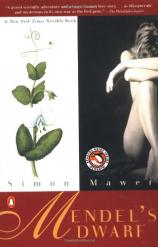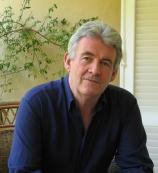Mendel's Dwarf
About the Book
Mendel's Dwarf
Dr. Benedict Lambert is a top man in his field, a geneticist who has won the respect and admiration of his peers. He is also the object of less desirable attention—the stares, sometimes pitying, often horrified, of everyone he encounters. For Dr. Lambert is a dwarf: "His body is not normal, his limbs are not normal. He possesses a massive forehead and blunt, pug-like features . . . He is one meter, twenty-seven centimeters tall."
Ben's parents, of average height and, in fact, average in every way, care for him as best they can. His mother braves the gamut of modern medicine, taking Ben from pediatrician to orthopedist, neurologist to orthodontist, all the while assuring him that it is his inner self, not his outward appearance, that matters. His father, who witnessed a nuclear test as a young soldier and perhaps harbors a secret guilt, assumes a different approach. "Never throughout the whole of my life can I remember his looking directly at me," Ben recalls. "Always his glance was aslant, tangential, as though that way he might not notice."
His childhood memories evoke only one person apparently indifferent to his condition. For his Uncle Harry, Ben's genetic aberration is far overshadowed by another quirk of inheritance. According to the family history Harry devotedly preserves, Ben is the great-great-great nephew of Gregor Mendel, the reclusive, brilliant Austrian friar who pioneered the study of genetics. While Ben shuns the implication that he shares his ancestor's "genius gene" as unscientific, his extraordinary intelligence does propel him along a pathway not open to the average sons of average people. He aces the entrance exam for the local grammar (public) school, goes on to earn a first class degree at Oxford, and is offered a job at the prestigious Royal Institute for Genetics. It takes only a brief negotiation to convince the Institute's market-savvy director to let him do research on the gene for achondroplasia (dwarfism). After all, as a real-life example of the arbitrariness of molecular biology other scientists can appreciate only second-hand, and related to the great Mendel, Ben presents an irresistible media opportunity. As the director notes with the lack of tact Ben has long grown inured to, "There's mileage in that. Might even get [the BBC] to do a documentary."
The desire to discover the genetic flaw that caused his condition may consume Ben in the laboratory, but other, less elevated, desires occupy his imagination. Though for obviously different reasons, Ben, like Mendel in his nineteenth-century monastery, is celibate. Resigned to intense love affairs with two-dimensional temptresses in Penthouse, Ben has just about given up on romance—until he enters the Institute's library and is greeted by Miss J. Piercey, the librarian from his home town. A kind, mousy woman, she had encouraged his early intellectual explorations and, quite innocently, fed his teen-age sexual fantasies. Miss Piercey—now the unhappily married Mrs. Miller—is eager to renew their friendship. Ben hopes for something more. Even the librarian's name—disguised by the neutral "J"—seems meant to stir a geneticist's heart. "I laughed when I discovered what the J stood for . . . Miss J. Piercey. Jean." For the first time in his life, fate is on his side, and Ben is soon enjoying pleasures of reciprocated love—as well as the thrills of flesh-and-blood sex. His own unexpected release from celibacy inspires Ben to look more closely at the private life of his genetic and intellectual forebear. Did Mendel also cherish "inappropriate" feelings? Struck by references in a biography to "a certain Frau Rotwang whom Mendel called upon frequently," Ben imagines the chaste, shy friar in the throes of forbidden love. The possibility that Mendel enjoyed the frequent company of a proper, married woman provides yet another link across generations, the imagined flirtation an old- fashioned variation of Ben's real and far lustier adventures with Jean.
Like a double helix, Mendel's Dwarf interweaves the nineteenth-century world of the genius whose work revolutionized modern biology and Ben's own late-twentieth-century existence and state of the art scientific explorations. Their success in untangling the mysteries of the "inheritable potency that, for better or worse, we all possess" resonates far beyond the achievements of two highly talented, eccentric researchers to raise profound questions about our definition of what constitutes normality.
Four years after Mendel began his seminal (literally and figuratively) study in 1856, the publication of Darwin's Origin of the Species galvanized the scientific community. According to Darwin, offspring are a blend of their parents. Because this reproductive pattern would obviously lead to less and less variation over a number of generations, Darwin attributed the dazzling variety within each species to an extremely high incidence of spontaneous mutation. Darwin, as Mendel's experiments show, was wrong. Charting the appearance of dominant and recessive traits in garden-variety plants, Mendel discovered consistent ratios in generation after generation, and lay bare the mechanics of inheritance with the clarity of a pure mathematical proof. Mutations, far from being an integral part of evolution, are the (usually unwelcome) outcome of pure chance. Published in an obscure scientific journal in 1865, Mendel's work—the pivotal discovery in the history of human biology—went unnoticed. A man genuinely ahead of his time, the reclusive friar had created the new science of eugenics.
The world eventually caught up, embracing Mendel's research with a passion and transforming it into a rallying cry for ensuring the survival of the fittest through all available political, social, and medical means. The evidence is everywhere—from U.S. immigration laws in the 1920s which excluded those of "inferior" genetic makeup (including Jews and Slavs) to the sterilization statutes on the books of twenty-nine U.S. states in the 1930s; from the creation of Germany's Society of Racial Hygiene in 1905 to Hitler's Final Solution. Auschwitz, where an obsession with the "purity of genes" was corrupted into horrific guidelines for mass destruction, is but a two-hour drive away from Mendel's home village in the north of Moravia.
The old eugenics died with the Third Reich—the term itself is eschewed by all right-thinking people—but the "inheritable potency that, for better or worse, we all possess" continues to intrigue. In our own time, to take one example, The Bell Curve by Charles Murray and Richard J. Herrnstein purports to provide proof that black Africans are innately less intelligent than whites. As Ben wryly observes, their study demonstrates that "on average, black Africans are at the moment about as feebleminded as southern Europeans and Slavs and Jews were at the start of this century. Isn't it amazing what can happen in three generations?" The fact that genes code for protein, and that no protein can be biologically linked to intelligence, has conveniently escaped the notice of contemporary social critics intent on preserving the supremacy of "white civilization"—much as Mendel's own findings were ignored by the "enlightened" minds of his generation.
The emergence of a new eugenics (under the now politically correct name of genetics) is not confined to controversial books by pseudo-scientists, however. At a conference honoring him for identifying the genetic signal for achondroplasia, Ben spells it out: "Each year in the United States alone some thirty thousand babies are conceived by anonymous sperm donation. At the very least the donated sperm is certified to come from genetically healthy donors. At the worst it comes from William Shockley...Now you can choose your embryos and implant only healthy ones...more than theoretical interest to Ben. Reunited with a husband whose many inadequacies include infertility, Jean has convinced Ben to participate personally in this brave new world by helping her have the child she longs for. He has donated the sperm for the in vitro fertilization that results in eight embryos—half carrying the dominant gene for dwarfism, the others perfectly "normal"—and even selected the one Jean carries successfully to maturity. At the very moment Ben is addressing the conference, Jean is giving birth.
In Mendel's Dwarf, Simon Mawer, a biologist who has written three previous novels, chronicles the triumphs of science and the trials of love (and vice versa) with grace, humor, and unusual candor. The result is a riveting novel, which was named a New York Times Notable Book and chosen as a finalist for the Los Angeles Times Book Award. "Call it a hybrid, call it a mutation," Melvin Jules Bukeit wrote in The Philadelphia Inquirer, "it's a grand scientific adventure and a tragic human love story combined, as idiosyncratic and mysterious in its own way as the first gene formed out of cosmic dust."
Mendel's Dwarf
- Publication Date: July 1, 1999
- Paperback: 336 pages
- Publisher: Penguin (Non-Classics)
- ISBN-10: 014028155X
- ISBN-13: 9780140281552









